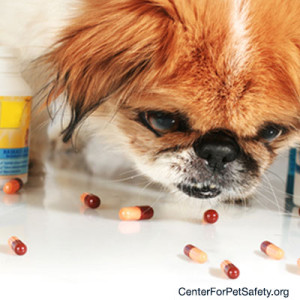Center for Pet Safety has prepared the following information to help you keep your pets safe.
 Poisonings are typically accidental in nature and pet owners won’t necessarily be able to identify exactly what is wrong, because the symptoms can range from general vomiting and diarrhea to lethargy and excessive salivation. While those are not the only signs, if you even suspect your pet has ingested something toxic, call your veterinarian immediately.
Poisonings are typically accidental in nature and pet owners won’t necessarily be able to identify exactly what is wrong, because the symptoms can range from general vomiting and diarrhea to lethargy and excessive salivation. While those are not the only signs, if you even suspect your pet has ingested something toxic, call your veterinarian immediately.
Toxic items leading to pet poisonings run rampant throughout the home and the landscape.
Medications:
The most concerning items are human medications that are in an accessible area or accidentally dropped. These incidents are the leading cause of accidental pet poisonings.
Do you have an elderly parent who has a pet? Pets are wonderful and essential companions in our twilight years, however, close monitoring is needed to ensure the safety of your parent and the safety of the pet. Medications are easy to drop through less than nimble fingers and the medications that are commonly prescribed (Coumadin, Lasix, Blood Pressure Medications) are highly problematic if consumed by a pet. Our recommendation is to visit often to ensure consistent monitoring for everyone’s safety.
Diet Food Products:
Sugar-Free gums and candies, assorted food items and toothpaste that contain Xylitol are exceptionally dangerous to your pet and can be highly toxic – even in small quantities. If you carry sugar free items in your purse or office tote, be sure to place it out of reach of your pets. They love the fruity fragrances of these products and as pet owners, we know they have a habit of getting into things.
Other Foods:
Table scraps are common treats for pets. While you may feel you are being a good pet parent by treating your pet, know that some foods can be dangerous for your pet to consume. Below is a short list of the biggest offenders you want to avoid giving to your pet.
· Avocado (specific to birds, rabbits, horses and other large animals
· Alcohol
· Bread Dough: Raw
· Chocolate
· Grapes (including raisins/currants)
· Macadamia nuts
Plants:
Of special concern with cats and with the Easter holiday approaching: Lilies. Lilies of the Lilium or Hemerocallis families are highly toxic to our feline friends and if ingested in small quantities can cause permanent kidney damage.
Other plant materials in the landscape that are lovely in the garden can be toxic to our pets. Because this list is so lengthy, it is good practice to monitor your pets when they have access to your landscaped space. Ensure they don’t chew or consume plant materials or their fruits/berries.
Beware of Button Batteries:
While pet households are full of items that can be toxic to pets, in recent years, with the development of button batteries, pet owners have more monitoring to do. Button Batteries are those little tiny batteries for hearing aids or electronics that are small, typically no larger in diameter than a nickel – and very easily dropped. They contain toxic elements and should your pet ingest one – do not induce vomiting – promptly contact your vet or get your dog to the nearest emergency vet immediately.

Comments are closed.